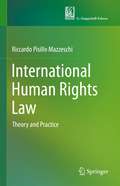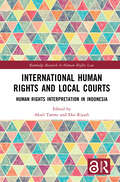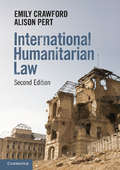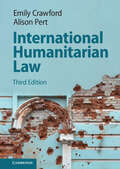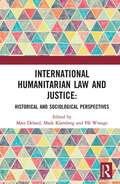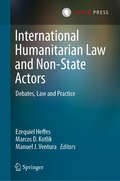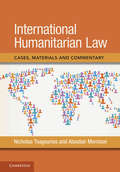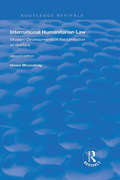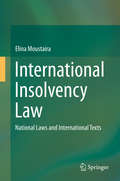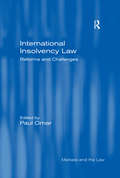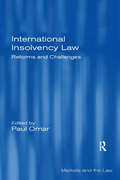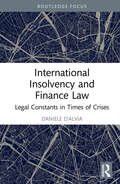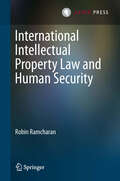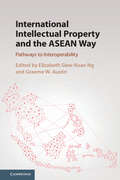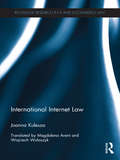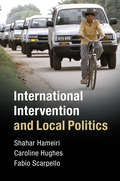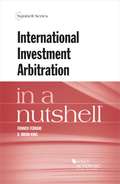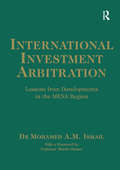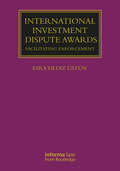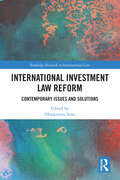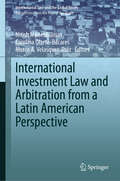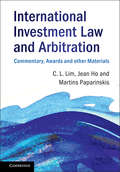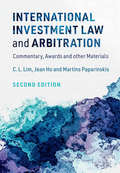- Table View
- List View
International Human Rights Law: Theory and Practice
by Riccardo Pisillo MazzeschiThis textbook provides a thorough and systematic overview of human rights law, including the most relevant practice and case law, but also dealing with theoretical issues. It pursues an original approach, seeking to reconcile its didactic purpose with a scientific one, positing that there must be a necessary synergy between these two purposes. Furthermore, the author is convinced that international human rights law should not be studied (as is done in virtually every textbook) as a special legal regime, separate and autonomous from the overall system of international law; but as a regime that is fully integrated into the international legal order. The book’s dominant theme is the interrelationship of international human rights law and general international law. Following this approach, the author has chosen to devote comparatively little content to institutional issues (Part IV) and to instead more intensively explore the structural impact of human rights law on the entire international order (Part I); on the sources (Part II) and obligations (Part III) of general international law; and what constitutes “fundamental” human rights (Part V), without neglecting other rights (Part VI).
International Human Rights and Local Courts: Human Rights Interpretation in Indonesia (Routledge Research in Human Rights Law)
by Aksel TømteThis book addresses the technicalities of how international human rights law can be applied at the domestic level through a case study of the human rights methodology of the Indonesian judiciary. Numerous international human rights treaties have been ratified by States parties all around the world. However, local implementation has proven a difficult task for national authorities with every State struggling to realize rights to varying degrees. This reveals a gap between the standards of human rights as envisaged by the law and those experienced by rights holders at the local level. This work analyses how Indonesian courts interpret and apply human rights. It discusses the position of human rights within specific areas of Indonesian law: constitutional law, criminal law and private law. It analyses how courts have dealt with specific cases within these fields of law. Its key contribution lies in its detailed attention to the role of the Indonesian judiciary in implementing human rights, as well as to the influence of international law, and the role that actors other than the judiciary play in this process. It also incorporates international comparative perspectives. The book will be of particular interest to human rights scholars concerned with national judiciaries’ role in human rights implementation, and to scholars, judges, civil society actors and legal practitioners working with law and human rights in Indonesia.The Open Access version of this book, available at http://www.taylorfrancis.com, has been made available under a Creative Commons [Attribution-Non Commercial-No Derivatives (CC BY-NC-ND)] 4.0 license.
International Human Rights: Universalism Versus Relativism (Frontiers of Anthropology #6)
by Alison Dundes RentelnThe universality of international human rights has been an enduring issue. This volume argues that the positions of universalists and cultural relativists are not diametrically opposed and that it is possible to demonstrate, empirically and cross-culturally, the existence of worldwide human rights.
International Humanitarian Law
by Crawford, Emily and Pert, Alison Emily Crawford Alison PertThis clear and concise textbook provides an accessible and up-to-date examination of international humanitarian law. With the aid of detailed examples, extracts from relevant cases, and useful discussion questions, students are expertly guided through the text. A recommended reading list is included in every chapter to support deeper engagement with the material. Emerging trends in theory and practice are also explored, allowing readers to build on their knowledge and grapple with some of the biggest challenges facing the law of armed conflict in the twenty-first century.
International Humanitarian Law
by Emily Crawford Alison PertThe law that regulates armed conflicts is one of the oldest branches of international law, and yet continues to be one of the most dynamic areas of law today. This book provides an accessible, scholarly, and up-to-date examination of international humanitarian law, offering a comprehensive and logical discussion and analysis of the law. The book contains detailed examples, extracts from relevant cases, useful discussion questions, and a recommended reading list for every chapter. Emerging trends in theory and practice of international humanitarian law are also explored, allowing for readers to build on their knowledge, and grapple with some of the biggest challenges facing the law of armed conflict in the twenty-first century. This second edition offers new sections on issues like detention in non-international armed conflict, characterisation of non-international armed conflicts, expanded chapters on occupation and the protection of civilians, means and methods of warfare, and implementation, enforcement and accountability.
International Humanitarian Law
by Emily Crawford Alison PertThe law that regulates armed conflicts is one of the oldest branches of international law, and yet continues to be one of the most dynamic and relevant areas of law today. Now in its third edition, this textbook provides an accessible, scholarly, and up-to-date examination of international humanitarian law, offering students and teachers a comprehensive and logical discussion and analysis of the law. The textbook contains detailed examples, extracts from relevant cases, and useful discussion questions and a recommended reading list for each chapter, to help students and teachers alike engage with the subject matter, and grasp how the theory and the practice interact. Developing and emerging trends in theory and practice of international humanitarian law are also explored and examined, allowing for readers to build on their knowledge, and grapple with some of the biggest challenges facing the law of armed conflict in the twenty-first century.
International Humanitarian Law and Justice: Historical and Sociological Perspectives
by Mats Deland Mark Klamberg Pål WrangeIn the last decade, there has been a turn to history in international humanitarian law and its accompanying fields. To examine this historization and to expand the current scope of scholarship, this book brings together scholars from various fields, including law, history, sociology, and international relations. Human rights law, international criminal law, and the law on the use of force are all explored across the text’s four main themes: historiographies of selected fields of international law; evolution of specific international humanitarian law rules in the context of legal gaps and fault lines; emotions as a factor in international law; and how actors can influence history. This work will enhance and broaden readers’ knowledge of the field and serve as an excellent starting point for further research.
International Humanitarian Law and Non-State Actors: Debates, Law and Practice
by Manuel J. Ventura Ezequiel Heffes Marcos D. KotlikThis book challenges the traditional approach to international law by concentrating on international hThis book challenges the traditional approach to international law by concentrating on international humanitarian law and placing the focus beyond States: it reflects on current legal, policy and practical issues that concern non-State actors in and around situations of armed conflict.With the emergence of the nation-State, international law was almost entirely focused on inter-State relations, thus excluding - for the most part - non-State entities. In the modern era, such a focus needs to be adjusted, in order to encompass the various types of functions and interactions that those entities perform throughout numerous international decision-making processes.The contributions that comprise this volume are oriented towards a broad readership audience in the academic and professional fields related to international humanitarian law, international criminal law, international human rights law and general public international law.Ezequiel Heffes, LLM, is a Thematic Legal Adviser in the Policy and Legal Unit at Geneva Call in Geneva, Switzerland, Marcos D. Kotlik, LLM, is Academic Coordinator at the Observatory of International Humanitarian Law of the University of Buenos Aires, School of Law and was a Judicial Fellow at the International Court of Justice between 2018-2019, and Manuel J. Ventura, LLM (Hons), is an Associate Legal Officer in the Office of the Prosecutor at the International Residual Mechanism for Criminal Tribunals, an Adjunct Fellow at the School of Law at Western Sydney University, and a Director of The Peace and Justice Initiative.
International Humanitarian Law: Cases, Materials And Commentary
by Nicholas Tsagourias Alasdair MorrisonDrawing together key documents, case law, reports and other essential materials, International Humanitarian Law offers students, lecturers and practitioners an accessible and critically informed account of the theory, law and practice of international humanitarian law. Providing comprehensive, thematic and targeted coverage of national and international cases and materials, this book successfully balances doctrine with practical application to help readers understand how the theories are applied in practice and navigate through jurisprudence with ease. Employing a critical and targeted commentary throughout, this book also helps readers to better understand the implications of the law and the challenges facing international humanitarian law today including: cyber war, detention, direct participation in hostilities, human rights in armed conflict and terrorism. Suitable for advanced undergraduate and postgraduate students and practitioners, International Humanitarian Law offers a thematic and comprehensive treatment of the subject.
International Humanitarian Law: Modern Developments in the Limitation of Warfare (Routledge Revivals)
by Hilaire McCoubreyFirst Published in 1998, this book presents an analysis of international humanitarian law, the law governing and seeking to mitigate the conduct of armed conflict. Since the first edition of this work came out in 1990 there have been important developments in the law and, sadly, a continuing experience of armed conflict and the humanitarian crises which it represents. As a result, this is not so much an ‘updating’ as the offering of a new book. International humanitarian law is here taken as coterminous with the jus in bello and covers both its ‘Geneva’ and ‘Hague’ elements dealing, respectively with the humanitarian protection and assistance of victims of armed conflict and the controls and restrictions placed upon methods and means of warfare. The rules and principles of international humanitarian law are presented and analysed in the context of their practical application in warfare, with emphasis upon recent experience. The Work is Primarily dedicated to the law relating to international armed conflict but also includes discussion of the relevant law applicable to non-international and ‘low level’ conflict.
International Insolvency Law: National Laws and International Texts
by Elina MoustairaThis book presents problems that often arise in the context of international/cross-border insolvencies; analyzes and compares national legislations and jurisprudence; elucidates the solutions offered by international/regional instruments; and explores the differences in the implementation of these instruments by various countries and the consequences of these differences. It examines in detail a number of famous and less famous cases tried by national courts, in which it became readily apparent that insolvency law remains one of the bastions of national law. In addition, the book discusses the notion of transplanting foreign [international] insolvency rules and especially the influence that US insolvency law has exerted on other countries’ insolvency [and international insolvency] law. Far from adopting an unrealistically optimistic stance, it soberly examines the complications of cross-border insolvencies, while also presenting potential solutions.
International Insolvency Law: Reforms and Challenges (Markets And The Law Ser.)
by Paul OmarInternational insolvency is a newly-established branch of the study of insolvency that owes much to the phenomenon of cross-border incorporations and the conduct of business in more than one jurisdiction. It is largely the offspring of globalization and involves looking at both law and economic rules. This book is a compendium of essays by eminent academics and practitioners in the field who trace the development of the subject, give an account of the influences of economics, legal history and private international law, and chart its relationship with finance and security issues as well as the importance of business rescue as a phenomenon. Furthermore, the essays examine how international instruments introduced in recent years function as well as how the subject itself is continually being innovated by being confronted by the challenges of other areas of law with which it becomes entangled.
International Insolvency Law: Themes and Perspectives (Markets And The Law Ser.)
by Paul OmarInternational insolvency is a newly-established branch of the study of insolvency that owes much to the phenomenon of cross-border incorporations and the conduct of business in more than one jurisdiction. It is largely the offspring of globalization and involves looking at both law and economic rules. This book is a compendium of essays by eminent academics and practitioners in the field who trace the development of the subject, give an account of the influences of economics, legal history and private international law, and chart its relationship with finance and security issues as well as the importance of business rescue as a phenomenon. Furthermore, the essays examine how international instruments introduced in recent years function as well as how the subject itself is continually being innovated by being confronted by the challenges of other areas of law with which it becomes entangled.
International Insolvency and Finance Law: Legal Constants in Times of Crises (Insights on International Economic Law)
by Daniele D'AlviaFocusing on the Global Financial Crisis 2007-2010 and the new emerging Covid-19 crisis in 2020, this book examines the discourse on risk and uncertainty in the markets through the lens of financial crises. Such crises represent a failure of the law to regulate, and constitute the basis through which a new theory of legal constants can be introduced in comparative law. Crisis impose a dramatic reformulation of the law, the Covid-19 confirms this trend, and new out-of-law instances are appearing beyond a paternalistic approach of direct State regulation. Restructuring procedures are playing a vital role in businesses’ survival, and new out-of-law mechanisms such as moratorium agreements and private workouts have become essential to preserve businesses. It is clear that the role of the law has completely changed, and this book argues that constants outside of the law are new ways to promote an “uncodified-codification” of the law. The case for uncodified uncertainty in the Covid-19 crisis is a primary example of how no codification process can ignore the importance of out-of-law instances in the act of making law. This book explores how this approach influences the harmonisation process of international economic law between national insolvency regimes and international agreed frameworks, demonstrating the role of comparative law in formulating legal constants using Covid-19 and the complexity of modern financial markets as the criterion to introduce the reader to this new theory, which claims a new role for comparative law in policy making processes within the framework of international economic law.
International Intellectual Property Law and Human Security
by Robin RamcharanThis book examines how intellectual property rights (IPR) affect the daily lives of individuals worldwide and how that may in turn impact the health and wealth of nations. While the protection of the intellectual endeavours of authors and inventors is vital for a fair and just society it is important that the IPR regime remains flexible enough to encourage creativity, innovation and the free flow of information and technology that are critical to the well being of billions of people, especially in the developing world. This work examines the implications of the IPR regime for basic human security. It examines the relationship between IPR regime and fundamental human rights, such as the right to education, health and food, and the broader right to development. This book will be of interest to IP scholars, international relations specialists and international security analysts, in particular those interested in non-traditional security issues. It may also serve as resource book for the international business community on developmental and human rights aspects of IP.
International Intellectual Property and the ASEAN Way: Pathways to Interoperability
by Elizabeth Austin Siew-Kuan Ng Graeme W.The Association of Southeast Asian Nations (ASEAN) is actively seeking ways for member countries to enhance their individual economic development within the context of overall regional advancement. Central to this is the creation of a regional intellectual property framework. This book examines the efforts to move beyond sovereign protections of intellectual property rights and establish meaningful inter-state cooperation on intellectual property issues. Rather than aim for IP harmonization, ASEAN recognizes its internal diversity and pursues an agenda of 'IP Interoperability'. The essays in this collection examine the unique dynamics of 'interoperability', analyzing the administration of intellectual property in a part of the world that is of increasing importance. The book enables the reader to compare and contrast the ASEAN model to other approaches in regional cooperation, such as Europe and Latin America, and also explores private international law as a potential vehicle for interoperability.
International Internet Law (Routledge Research in Information Technology and E-Commerce Law)
by Joanna KuleszaThis book discusses the international legal issues underlying Internet Governance and proposes an international solution to its problems. The book encompasses a wide spectrum of current debate surrounding the governance of the internet and focuses on the areas and issues which urgently require attention from the international community in order to sustain the proper functioning of the global network that forms the foundation of our information fuelled society. Among the topics discussed are international copyright protection, state responsibility for cyber-attacks (cyberterrorism), and international on-line privacy protection. Taking a comparative approach by examining how different jurisdictions such as the United States, the European Union, China and Singapore have attempted various solutions to the problem of Internet Governance, the author offers a practical solution to the problem and is a proponent of International Internet Law. Kulesza suggests that just as in the case of International Environmental Law, an Internet Framework Convention could shape the starting point for international cooperation and lead to a clear, contractual division of state jurisdictional competences. International Internet Law is of particular interest to legal scholars engaged with the current challenges in international law and international relations, as well as students of law, international relations and political science. The issues discussed in the book are also relevant to journalists and other media professionals, facing the challenges of analyzing current international developments in cyberspace.
International Intervention and Local Politics: Fragmented States And The Politics Of Scale
by Shahar Hameiri Caroline Hughes Fabio ScarpelloInternational peace- and state-building interventions have become ubiquitous in international politics since the 1990s, aiming to tackle the security problems stemming from the instability afflicting many developing states. Their frequent failures have prompted a shift towards analysing how the interaction between interveners and recipients shapes outcomes. This book critically assesses the rapidly growing literature in international relations and development studies on international intervention and local politics. It advances an innovative approach, placing the politics of scale at the core of the conflicts and compromises shaping the outcomes of international intervention. Different scales - local, national, international - privilege different interests, unevenly allocating power, resources and political opportunity structures. Interveners and recipients thus pursue scalar strategies and socio-political alliances that reinforce their power and marginalise rivals. This approach is harnessed towards examining three prominent case studies of international intervention - Aceh, Cambodia and Solomon Islands - with a focus on public administration reform.
International Investment Arbitration In A Nutshell (Nutshells)
by C. Ryan Reetz Franco Ferrari D. Brian King Domenico Di Pietro Friedrich Rosenfeld Monique SassonForeign direct investment ("FDI") is a key pillar of the world's global economy. International investment law comprises the rules regarding the protection of investors engaging in FDI activities. This book summarizes the current legal regime of international investment protection and the challenges that lie ahead of it. Its ambition is to provide a concise introduction to the key substantive and procedural standards of international investment protection.
International Investment Arbitration: Lessons from Developments in the MENA Region
by Mohamed A.M. IsmailArbitration is the most common mechanism for disputes' settlement in developing countries. Following the move to free market economies, arbitration will play an increasingly fundamental role in order to protect foreign investors in the Middle East and North African Region (MENA). This book examines the pulse and dynamics of international investment arbitration and the new era of mediation in state contracts in the region. The author explores the harmonization of international arbitration and the sensitive issue of le Contrat Administratif in Middle East civil law countries. The volume also discusses the pivotal role of international organizations such as UNCTAD and ICSID in codifying fair and prompt mechanisms for dispute settlement. Using Latin American countries as a prime example of how international legislative instruments serve international investment law principles and comparing Latin American experiences where appropriate, the book demonstrates how lessons can be learned in respect of alternative dispute resolution, international commercial arbitration and investor-states arbitration. It provides suggestions and recommendations for the future and includes useful appendices detailing recent worldwide trends, regional and international instruments in the arbitration world.
International Investment Dispute Awards: Facilitating Enforcement (Lloyd's Arbitration Law Library)
by Esra Yildiz ÜstünThis book examines how international investment arbitral awards can be facilitated. It sets out to achieve a fuller conceptualisation and theorisation of awards through a discussion of relevant issues and themes, as well as demonstrating how they can be achieved through a comparative approach that has been conceived and developed with reference to existing deficiencies in the research literature. This contribution is particularly important given the worldwide emergence of investment arbitration as a powerful form of alternative dispute resolution (ADR). The book ultimately seeks to explore and develop solutions that can be directed to an existing oversight and deficit within the international investment architecture. In considering the advantages and disadvantages of each ‘solution’, it will work towards an approach best-suited to upholding the interest of the victorious party at the enforcement stage. The enforcement of arbitral awards on a voluntary basis has proven to be insufficient, and this created a real and ongoing shortcoming that needs to be addressed. International Investment Dispute Awards: Facilitating Enforcement therefore seeks to directly influence existing practice on the part of international institutions, with the intention of helping to develop a more effective resolution. The readerships for this book will include arbitration practitioners, policy-makers (including treaty drafters), academics and postgraduate students interested in the enforcement of investment arbitral awards.
International Investment Law Reform: Contemporary Issues and Solutions (Routledge Research in International Law)
by Obiajunwa AmaThis book offers contemporary assessment of the challenges facing international investment law and proposes innovative solutions for reform.The most controversial issue in international investment law is on the settlement of investor-state disputes and its implications on national regulatory autonomy. This book recognises that current literature in international investment law fails to adequately incorporate diverse perspectives. Therefore, it interrogates the United Nations Sustainable Development Goals and their relationship with international investment policies of developing countries, particularly in Africa where there has been a marked increase in investor-state disputes. Despite existing reform proposals by the UNCITRAL Working Group III, and emerging progressive treaty drafting practices around the world, there remains a need for further clarity on how the world should proceed in reforming and restructuring international investment law and policy. This book contributes to existing body of research knowledge by presenting new evidence and proposing practical solutions to enhancing the regulation of international investments and promotion of sustainable development.It will inform a range of stakeholders including investors, civil society organisations, States, students, and international organisations such as the World Bank.
International Investment Law and Arbitration from a Latin American Perspective (International Law and the Global South)
by Nitish Monebhurrun Carolina Olarte-Bácares Marco A. Velasquez-RuizThe book brings to light how Latin American states have traditionally stood before the field of International Investment Law and Arbitration. It delves into their posture of resistance to critically examine how their perspective has gradually changed and how they have adapted and molded their investment agreements so as not to leave their position as players in the field of International Investment Law. Many Latin American states have appeared as defendants before international investment tribunals and some of these, like Venezuela, Bolivia or Ecuador, have denounced their international investment agreements. Deeming the law field as imbalanced, they have looked for alternatives to continue providing legal protection to foreign investors while protecting their right to regulate in the name of public interest. Some interesting investment agreements models, sometimes of a different ilk, have consequently flourished and have arrested the attention of those studying or working with international investment law.The main objective of this book is to critically discuss how Latin American states have accepted, resisted, or adapted themselves to international investment law and arbitration. Accordingly, the general connection between these states and international investment law are explained in an introduction which examines the general trends as per which Latin American states have offered a legal protection to foreign investments. The first part enters the merits of where international investment law and arbitration stand in some Latin American states whereby the experience of Brazil, Chile, Argentina, Venezuela, and Uruguay are discussed. The following parts explain the trends in international investment law and arbitration in Latin America. These trends are namely related to dispute settlement and governance, to the connection between investment law and human rights and finally to regionalization. In these parts, the experience of states like Brazil,Colombia, Peru, and Mexico are perused.
International Investment Law and Arbitration: Commentary, Awards And Other Materials
by Chin Leng Lim Jean Ho Martins PaparinskisWhat was once a contested body of principles applied peripherally to the international settlement of expropriation disputes has been transformed and in its place now stands an important area of international disputes practice. International Investment Law and Arbitration offers a comprehensive introduction to the subject. <P><P>Presenting the facts of daily legal practice and the largely unaltered aims of the subject alongside a broad selection of key awards and original materials, historical developments are discussed in the context of the changing directions in the arbitral jurisprudence and current treaty and arbitration reform debate.<P> Key features: accessible and engaging commentary integrated throughout, end of chapter questions test reader understanding, further reading lists support and encourage exploration of the subject. Suitable for postgraduate law students studying modules on international investment arbitration, International Investment Law and Arbitration offers an indispensable introduction to the subject.<P> Accessible commentary accompanies key awards and materials.<P> Historical developments are discussed in the context of the changing directions in the arbitral jurisprudence and current treaty and arbitration reform debate.<P> Every chapter has questions to test reader understanding as well as a list of further reading to encourage exploration of the subject.
International Investment Law and Arbitration: Commentary, Awards and other Materials
by Jean Ho Martins Paparinskis C. L. LimInternational investment law and arbitration is a rapidly evolving field, and can be difficult for students to acquire a firm understanding of, given the considerable number of published awards and legal writings. The first edition of this text, cited by courts in Singapore and Colombia, overcame this challenge by interweaving extracts from these arbitral decisions, treaties and scholarly works with concise, up-to-date and reliable commentary. Now fully updated and with a new chapter on arbitrators, the second edition retains this practical structure along with the carefully curated end-of-chapter questions and readings. The authors consider the new chapter an essential revision to the text, and a discussion which is indispensable to understanding the present calls for reform of investment arbitration. The coverage of the book has also been expanded, with the inclusion of over sixty new awards and judicial decisions, comprising both recent and well-established jurisprudence. This textbook will appeal to graduates studying international investment law and international arbitration, as well as being of interest to practitioners in this area.
